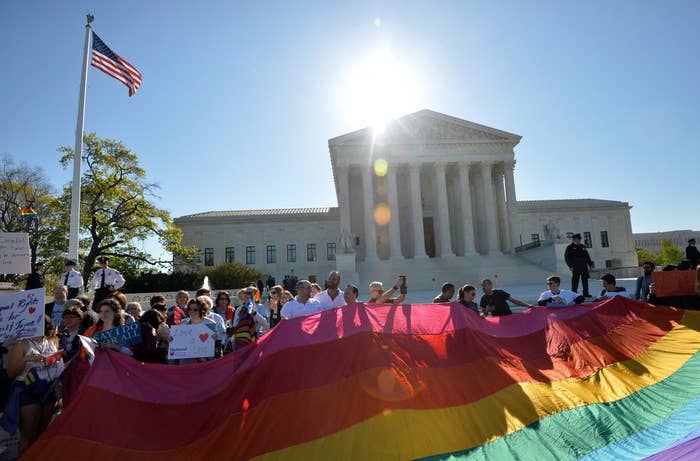
WASHINGTON — At Tuesday's Supreme Court arguments over same-sex couples' marriage rights, the majority of the court appeared to be comfortable with Justice Anthony Kennedy's understanding of human dignity as including gay people's equal treatment under the law.
While Kennedy, who is considered the key vote in the case, did not make any unambiguous statement about the end result of the case, he harshly questioned the state of Michigan's argument that it should be allowed to exclude same-sex couples from marriage.
At one point, Kennedy commented to Michigan's lawyer that its law banning same-sex couples from marrying "assumes" that those couples can't have the same "more noble purpose" as opposite-sex couples have for entering marriage.
Kennedy — joined often by Justices Stephen Breyer, Sonia Sotomayor, and Elena Kagan — peppered the lawyer defending marriage bans, John Bursch, about what other limits states could constitutionally place on marriages and whether the states' claimed interests amounted to anything more than, as Sotomayor put it at one point, a "feeling" that "doesn't make any logical sense."
Although questions were asked, including by Kennedy, about the length of time — "millennia," he said — that the understanding of marriage was only an institution between one man and one woman, Kennedy noted in the same question that "about the same time" passed between the Supreme Court's decision ending "separate but equal" with regards to racial discrimination and its landmark decision ending interracial marriage bans as has passed between the Supreme Court's decision ending sodomy laws and today's arguments.
Justices Ruth Bader Ginsburg also appeared in questioning to be sympathetic to same-sex couples' marriage arguments.
Chief Justice John Roberts asked probing question of both sides, never betraying a strong affinity towards either sides' arguments, while Justice Samuel Alito strongly questioned the plaintiffs' claims — raising questions about polygamy and why siblings shouldn't be able to receive the same protections as same-sex couples.
While Kennedy did question the lawyers supporting marriage equality, Mary Bonauto and Solicitor General Donald Verrilli Jr., at times he appeared focused on explaining the path forward from the trio of "gay rights" cases — 1996's Romer v. Evans, 2003's Lawrence v. Texas, and 2013's United States v. Windsor — to a marriage equality decision in Tuesday's cases.
Echoing his earlier comment to Bonauto, Kennedy later posed the question, again, to Verrilli — making his point even more directly. "Haven't we learned a tremendous amount since ... Lawrence, just in the last 10 years?" he asked the Obama administration's lawyer.
Breyer, in questioning Michigan's lawyer, laid out as concise a summary of the opposition to bans on same-sex couples' marriages as any of the lawyers arguing for marriage equality made.
"[M]arriage, as the states administer it, is open to vast numbers of people who both have children, adopt children, don't have children, all over the place," he said. "But there is one group of people whom they won't open marriage to. So they have no possibility to participate in that fundamental liberty. That is people of the same sex who wish to marry. And so we ask, why?"
There were two questions before the court Tuesday, though. The first, which got 90 minutes of argument time, was whether the 14th Amendment requires states to permit same-sex marriage. The second was whether states that don't allow same-sex marriage must recognize those marriages performed in other states — a question that several justices said only would come into play if the plaintiffs lost on the first question.
Kennedy's sole question in that final hour of arguments was first to reiterate that the second question only would become relevant if the states' arguments won the day on the first question and then to ask whether the recognition answer could be different than the marriage ruling.
His near-complete silence on the second question — as opposed to his constant questioning on the first question — was another signal from the justice about where his vote was headed on the first question.
Notably, though, Chief Justice Roberts did appear open to arguments on the recognition question. "[O]utside of the present controversy," he asked the Tennessee Attorney General's Office attorney defending the recognition bans, Joseph Whalen, "when was the last time Tennessee declined to recognize a marriage from out of state?"
"1970 is the last one that I could point to," Whalen responded. "That involved a stepfather and stepdaughter."
Tuesday's arguments followed a winding path for the cases, the first of which (an adoption case out of Michigan) was filed in 2012. The remaining cases were all filed in the aftermath of the June 2013 Supreme Court decision in United States v. Windsor striking down the Defense of Marriage Act.
The decision in the cases came over several months, and by the summer of 2014, the cases for marriage or marriage recognition had won in all four states of the 6th Circuit Court of Appeals (Kentucky, Michigan, Ohio, and Tennessee).
That August, the appellate court took up the four states' appeals. When the 6th Circuit became the first appellate court to uphold marriage bans since Windsor, Supreme Court review looked almost certain, and the justices accepted the cases for review in January, setting up Tuesday's arguments.
A decision in the cases is expected by the end of the court's term in June.
